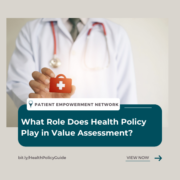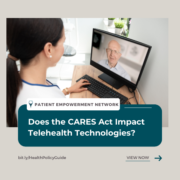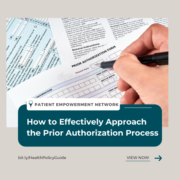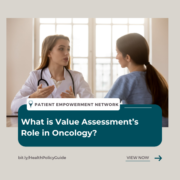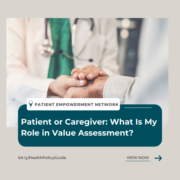What Role Does Health Policy Play in Value Assessment?
What Role Does Health Policy Play in Value Assessment? from Patient Empowerment Network on Vimeo.
Jennifer Bright, CEO of Innovation and Value Initiative explains what role health policy plays in value assessment and health technology.
See More from the Health Policy Activity Guide
Transcript
Mary Leer:
What role does health policy play in value assessment/health technology assessment?
Jennifer Bright:
Policy has a really important role to play, especially at this time here in the US, as I pointed out earlier in our discussion, that there is a debate about best methods and what data and information we really need at our fingertips in order to make good decisions. And that’s not just at the health plan level or at the employer level, it’s also at the policy level, and so IVI does a lot of work in communicating about the work we do in the changing health economic modeling and doing different evaluations about patient preferences and how they have an impact on value assessment. We’re trying to communicate to the policy maker community writ large, why, because their decision-making about what the rules of road are in determining value here in the US is a really important missing voice. So, for example, we have a lot of CMS, we have employers, we have a lot of health plans that are coming out and talking about the importance of health equity. It’s a big topic and it’s an appropriate topic for us to be talking about. In our view at IVI, health equity is potentially could be worsened if we do not approach value assessment and health technology assessment with the patient perspective in mind, why?
Because if we already have clinical data that is missing representativeness, and if we already have used economic evaluation methods that kind of eliminate the perspective of patients and families and their real experience in care, we are really at risk of hard-coding disparities in decision making in what you have access to as a patient, and that’s a very dangerous thing. And so that reason of that topic area of health equity is probably one of the biggest reasons why policy makers need to be understanding this landscape and the challenges from a scientific standpoint, and what the gaps are, and policy makers have a huge role to play, especially in championing the importance of having patient perspective represented in clinical trials represented in the line of value assessment, in having ability to calculate the cost on not just the patient, but the family and the caregiver. What’s the impact on their ability to work? All of those things are very complex, but they are all part of that value picture, and right now, there’s a bit of the tug of war in the health economics community about who’s got the best method, and we have a community that’s very used to doing value assessment the way they’ve always done it.
And we believe at IVI that policy makers have a really important role in being a lever for change and kind of advocating for, pushing scientists to use different methods, but most importantly, to make sure that patient, family and caregiver voices are always at the table.

